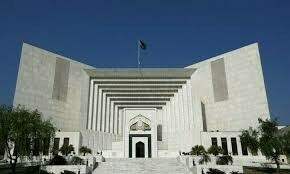• Meeting to discuss July 12 ruling remains inconclusive; ECP may seek SC guidance
• Official raises concerns about contacting PTI given its ‘lack of structure’
• Chief election commissioner consults LHC chief justice on election tribunals
ISLAMABAD / LAHORE: The Election Commission of Pakistan (ECP) on Thursday held a crucial meeting to discuss the Supreme Court’s last week verdict on the PTI’s eligibility for reserved seats but failed to reach a decision, with one official suggesting that the commission may need to seek further directions from the top court amid lack of clarity.
The meeting, chaired by Chief Election Commissioner Sikandar Sultan Raja via video link, was attended by ECP members and senior officials, including the secretary and special secretary, the ECP said in a brief statement.
Meanwhile, Mr Raja also met Lahore High Court (LHC) Chief Justice Aalia Neelum on Thursday to discuss the appointment of election tribunals in Punjab.
The meeting on PTI’s reserved seats focused on the Supreme Court’s July 12 judgement and its implementation. The ECP’s legal team presented various legal aspects of the case. It was decided that another meeting would be held today (Friday) to reach a conclusion.
The Supreme Court, through a majority verdict of 8-5, declared the PTI a parliamentary party and ruled that it is eligible for reserved seats for women and non-Muslims in the National and provincial assemblies, potentially making it the single largest party in both houses of parliament.
A senior ECP official told Dawn that the notifications of 39 PTI MNAs who mentioned their affiliation with the party had no problem. However, the documents of 41 other MNAs need a detailed scrutiny.
He said that under the Supreme Court’s judgement, the 41 independents would now have to file duly signed and notarised statements before the Election Commission within 15 days, explaining that they contested the Feb 8 general elections as a candidate of a particular political party.
Upon receiving these statements, the ECP will notify the concerned political party, seeking confirmation within 15 days. Following this, under Article 51 of the Constitution, the ECP will publish a list of the returned candidates on its website and submit a compliance report to the Supreme Court.
The Supreme Court order explains that under Article 51(5) of the Constitution, the PTI is entitled to reserved seats for women and minorities in the National and provincial assemblies of Khyber Pakhtunkhwa, Punjab and Sindh, based on the number of general seats it secured.
If the ECP or PTI need further clarification, the judgement allows the commission to seek directions from the Supreme Court by submitting an appropriate application to the judges constituting the majority.
The ECP official raised concerns about who in the PTI should be contacted for verification, given the party’s lack of structure and unrecognised intra-party elections, suggesting that the Election Commission might need to seek further directions from the Supreme Court.
Meeting with LHC chief justice
Mr Raja’s meeting with LHC Chief Justice Aalia Neelum came after the Supreme Court on July 5 suspended an LHC order and notification regarding the election tribunal appointments in Punjab following an ECP appeal.
The top court previously directed Mr Raja to engage in meaningful consultation with the LHC chief justice to form the tribunals.
LHC Registrar Abher Gul Khan also attended the meeting between the CEC and Chief Justice Neelum.
On June 12, then-LHC chief justice Malik Shahzad Ahmad Khan formed six additional election tribunals for Punjab following a single-bench judgement. However, the ECP found this action redundant due to a new ordinance empowering it to appoint retired judges to election tribunals.
The judgement originated from LHC’s Justice Shahid Karim, who, on May 29, allowed two identical petitions filed by PTI-backed independent candidates Salman Akram Raja and Rao Omar Hashim Khan, who had lost their general elections in the National Assembly constituencies NA-128 (Lahore) and NA-139 (Pakpattan), respectively.
The judge ordered the ECP to notify six additional election tribunals for Punjab based on nominations from the then-LHC chief justice within a week. If the ECP failed to comply, the judgement mandated that the LHC proceed with the appointments.
The ECP argued that the newly enacted Elections (Amendments) Ordinance 2024, amending the Elections Act 2017, rendered the LHC order meaningless.
Consequently, the Supreme Court suspended the LHC’s order and subsequent notification. The new law permits the appointment of retired judges as election tribunal members.
Published in Dawn, July 19th, 2024















































